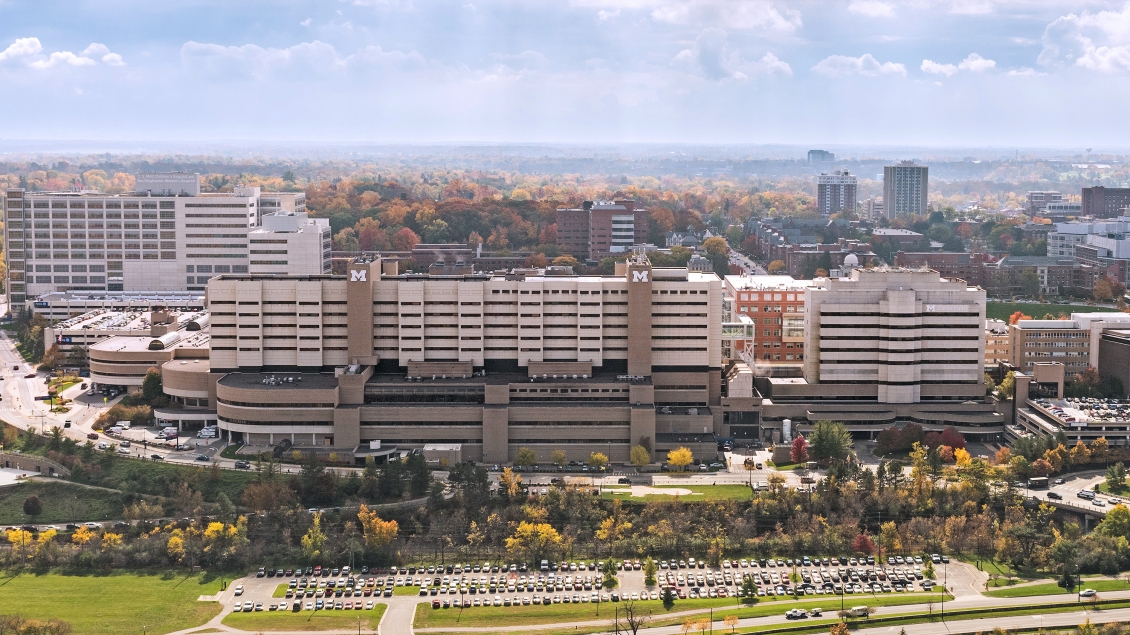
The Gastroenterology Fellowship Training Program provides a well-rounded blend of clinical training at the University Hospital, VA Ann Arbor and outpatient clinics.
The inpatient Gastroenterology & Hepatology Service at the University Hospital provides for primary, secondary, tertiary, and quaternary care for patients with digestive disease. This service is staffed by 2 attending physicians, 1 fellow, 2 senior residents, and 4 interns. The service accepts patients 24 hours per day.
The fellow's responsibility on the inpatient GI Hepatology Service is to serve as a "junior attending". They will be available for all consultations with the senior resident and will also evaluate and help manage patients on this service. The fellow's primary goal on this service is exposure to the broad array of patients with complex gastroenterological disease for which, in the future, they will be the primary managing physician. This includes patients with:
- complex inflammatory bowel disease particularly those requiring potential surgical assessment and treatment
- complex liver disease of all varieties including the pre-transplant patient
- acute and complicated gastrointestinal bleeding requiring endoscopic and/or surgical treatment
- severe malnutrition requiring nutritional support, and patients with complicated pancreaticobiliary disease
A minor emphasis will be on patients who have intestinal and/or hepatic tumors undergoing oncological treatment.
The inpatient GI Hepatology Service also serves as a step down unit from the Intensive Care Unit for patients who have complex digestive disease. The service sees an average of between 18 and 20 patients on a daily basis and has between 100 and 130 admissions per month. Teaching activities on the service include daily work rounds with the attending, fellow, and house officer staff evaluating and seeing all the patients on the service.
In addition, a daily didactic lecture is also given by the senior faculty. Histology conference, endoscopic evaluation conference, Barium X-ray conference, and evaluation of imaging techniques including CT Scan, MRI, abdominal ultrasound, endoscopic ultrasound and angiographic studies are also included.
The inpatient Consultation Service offers consultative care for patients on other services who have digestive disease problems. This includes the Surgical Services, Oncology Services, General Medicine Services, Cardiology Services, Pulmonary Services, and Intensive Care Unit Services. The service consists of an attending physician, 1 or 2 fellows, and 1 or 2 residents.
The primary teaching objective of the inpatient Consultation Service is the management of patients with multiple medical problems who have digestive disease. In addition, initial management of complex gastrointestinal diseases that require ICU care is also given. This includes patients with fulminant hepatic failure, severe GI bleeding requiring potential early surgical intervention, complex disease requiring rapid nutritional support, management of digestive disease problems in patients with transplantation (including bone marrow, cardiac, pancreatic, and kidney transplantation).
Both didactic and informal teachings are done during the consultation rounds. In addition, the fellows are expected to attend the inpatient daily didactic sessions. This service receives approximately 100 consultations per month.
At the University of Michigan Medical School, the Medical Liver Transplantation Service receives between 60 and 90 consults per month. This service is staffed by 1 faculty member and 1 or 2 fellows. Consultation rounds are conducted on a daily basis. Both didactic and informal teachings are done during consultation rounds.
The medical transplant team is integrated directly with the Surgical Transplant Service and works closely with the Transplantation Service. Direct communication with the Transplant Service is accomplished daily by both fellows and attendings. Conferences are scheduled with the Transplantation Service for both pre and post operative transplantation evaluation and management.
Expand your career trajectory in a high-volume academic medical center that also supports and excels in a wide range of basic science, translational and clinical research programs.
The clinics at the University Hospital operate on two half-days and at the VA on one half-day per week and are each supervised by at least three faculty members. Each fellow attends one of these half-day clinics per week and is encouraged to assume the role of personal physician to patients requiring long-term follow-up.
In addition, several subspecialty clinics have been established to offer focused patient care, education, and research opportunities in Inflammatory Bowel Disease, Gastrointestinal Cancer, Liver Disease, Biliary Tract Disorders, Gastrointestinal Motility Disorders, Esophageal Disease, and Peptic Ulcer Disease. These clinics are offered on four afternoons per week and time is available for fellows to attend. A large referral base from physicians within the state of Michigan, Ohio, Indiana, Illinois and from the various services at the University Hospital insures a broad spectrum of clinic patients.
Procedures are conducted on five mornings a week at both the University and VA Hospitals. All endoscopic procedures are supervised by faculty. Below are approximately how many procedures of each are performed each year:
- Upper Endoscopy (EGD) - 4,000
- Colonoscopy - 3,500
- Endoscopic Ultrasound - 1,200
- ERCP - 700
- Liver Biopsy - 400
- Esophageal Manometrics - 400
- 24 Hour pH Monitoring - 300
Numerous other procedures including endoscopic ultrasound, small bowel enteroscopy, pancreatic functions tests, H. pylori testing, esophageal stent placements, esophageal and hemorrhoid banding, sclerotherapy, laser therapy, biliary manometrics, breath tests, gastroduodenal and anorectal motility studies are performed in our Medical Procedures Unit (MPU).
The MPU is a multidisciplinary unit, opened in July 1991 and equipped with the most advanced gastroenterology equipment available. All procedures are recorded on an endoscopic network, and can be recalled or viewed live in the multimedia equipped teaching conference room. The purpose of the MPU is to provide state of the art facilities to support the patient care, clinical education, and clinical research missions of our program. The MPU is quickly gaining recognition as the largest, most advanced, and best endoscopy facility in the nation.